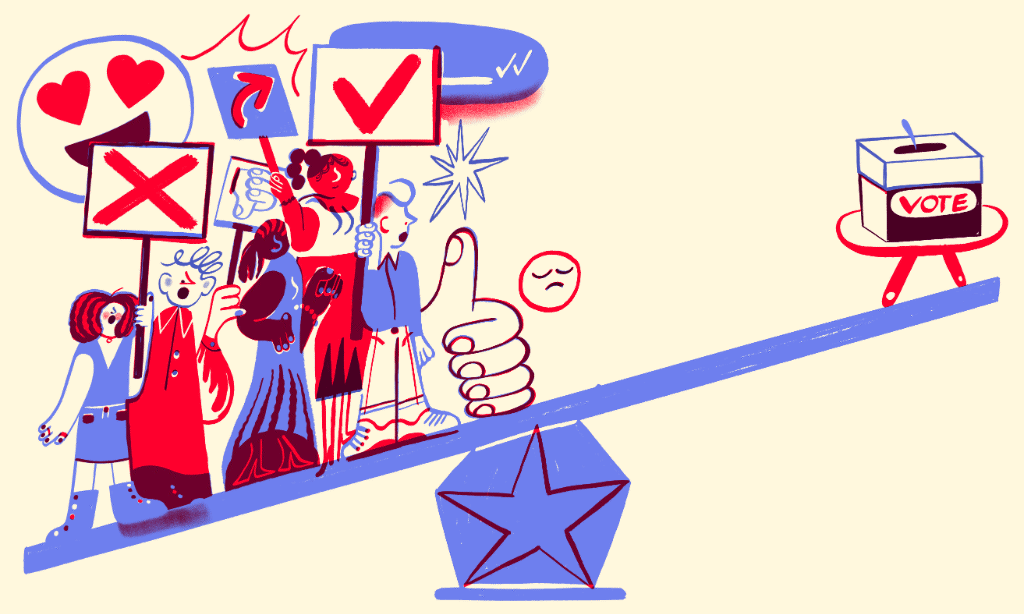“In close elections, every vote counts,” says political scientist Robert Shapiro, a professor of government at SIPA. “Any subgroup of voters can have a decisive impact on the results.”
Much attention over the past year has been focused on the attitudes of the subgroup known as Generation Z — the more than forty million young people, including eight million newly eligible voters, who were born roughly between 1995 and 2006. Shapiro thinks the votes of this important segment of the electorate will be driven by issues of particular concern to them: not just the economy (jobs, housing, inflation) but also reproductive rights, gun violence, and climate change. “That’s why the Democrats have been doing well among younger voters over the last twenty years,” he says. “But the question now is, what could offset that positive effect?”
Over the past year, a sense of discontent with the political system as a whole, combined with financial worries and anger over the Biden administration’s Mideast policy, has raised the possibility that many young people will stay home on Election Day. “I wouldn’t describe it as apathy, though,” says Grace Fitzgerald, a Columbia senior and president of the multi-partisan Columbia Political Union (CPU), a student organization founded in 1935 to foster political dialogue and civic engagement on campus and in the community. “It’s more like a protest. It’s a very intentional decision.”
At the same time, says Fitzgerald, President Joe Biden’s withdrawal from the race in July and the candidacy of Vice President Kamala Harris have greatly energized many disaffected Gen-Zers, including some who find fault with Harris’s record as a prosecutor. The result has been an unusual sort of embrace: “Gen Z is rallying around Harris in a way that is ironic, making jokes on TikTok and X to show they don’t fully support her but will rally around her,” Fitzgerald says. “Ironic praise allows people to support her without committing themselves to saying they support all her policies.”
Jack Lobel, a junior at Columbia College, believes his generation, snark aside, will show up — and in record numbers. “Gen Z is one-fifth of the electorate,” says Lobel, who is press secretary for Voters of Tomorrow, a nonprofit group that promotes youth-voter turnout through social-media outreach and on-the-ground organizing. “And we are motivated.”
While unrest on college campuses over the Israel-Hamas war has highlighted youth activism, recent polls out of Harvard and the news website Axios show that most young voters are concerned mainly with domestic issues. “This is the first presidential election post-Dobbs,” says Lobel, referring to the 2022 Supreme Court decision that overturned the constitutional right to an abortion. “We are angered by that decision, and it will likely push young people to vote in greater numbers than ever before.”
Because the US elects its president through the Electoral College rather than the popular vote, it’s in the battleground states — Shapiro names Michigan, Pennsylvania, Wisconsin, Nevada, Georgia, and Arizona, and potentially New Hampshire, North Carolina, and Minnesota — where the youth vote could be pivotal. Voters of Tomorrow is targeting young people in these states through texts, phone calls, and social media. “When young voters are contacted about elections, they are more likely to vote,” Lobel says. “And we want to ensure that Gen Z elects the candidates that are responsive to their concerns.”
No demographic group is monolithic, and there are plenty of political disagreements among young voters. But Lobel, who says youth-voter registration has skyrocketed with Harris’s candidacy, sees consensus around what young people don’t want: “When your agenda is to take us back in time, restrict our freedoms, deny climate change, and make it easier for assault weapons to fall into the hands of people who should not have access to them, you’re going to have a hard time winning over any meaningful segment of Gen Z.”
This article appears in the Fall 2024 print edition of Columbia Magazine with the title "The Zs Have It."



